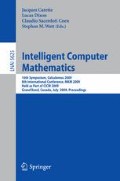Abstract
OMRS (Open Mechanized Reasoning Systems) was designed for Automated Theorem Proving and then extended to Computer Algebra. These are the two domains at the heart of the Calculemus approach. An obvious question is to assess whether such an approach can be extended to new domains either within AI or outside of AI. There have been several attempts to turn the world into a computational system. This talk stays away from such general attempts and introduces a framework that is fully set within AI. It extends the basic concepts of OMRS to diverse fields ranging from information technology to sociology through law as illustrated by examples. The main motivation is to claim that whatever the selected approach, Artificial Intelligence is gaining enough strength and power to reach new frontiers and to turn challenges that are not a priori of a purely computational nature into AI domains.
Access this chapter
Tax calculation will be finalised at checkout
Purchases are for personal use only
Preview
Unable to display preview. Download preview PDF.
References
Bertoli, P.G., Calmet, J., Giunchiglia, F., Homann, K.: Specification and integration of theorem provers and computer algebra systems. Fundamenta Informaticae 39(1-2), 39–57 (1999)
Calmet, J., Homann, K.: Structures for symbolic mathematical reasoning and computation. In: Limongelli, C., Calmet, J. (eds.) DISCO 1996. LNCS, vol. 1128, pp. 216–227. Springer, Heidelberg (1996)
Calmet, J., Lefevre, V.: Toward the Integration of Numerical Computations into the OMSCS Framework. In: Proceedings of the 7th International Workshop on Computer Algebra in Scientific Computing, Saint Petersbourg, Russia, pp. 71–79 (2004)
Calmet, J., Maret, P., Endsuleit, R.: Agent-Oriented Abstraction, Revista Real Academia de Ciencias (Madrid). Special Volume on Symbolic Computing and Artificial Intelligence 98(1), 77–83 (2004)
Calmet, J., Ollivier, F. (Guest eds.): Jacobi’s Legacy. AAECC Special issue 20(1) (April 2009)
Calmet, J., Maret, P., Schneider, M.: Cultural Differences as a Tool to Assess Trust in Virtual Enterprises (May 2009) (forthcoming)
Carriero, N., Gelernter, D.: A Computational Model of Everything. Communications of the ACM 44(119), 77–81 (2001)
Fredkin, E.: Digital Mechanics. Physica D 45, 254–270 (1990)
Ghins, M.: Laws of Nature: Do we Need a Metaphysics? Principia 11(2), 127–149 (2007)
Giunchiglia, F., Pecchiari, P., Talcott, C.: Reasoning Theories: Towards an Architecture for Open Mechanized Reasoning Systems. Tech. Rep. 9409-15, IRST, Trento, Italy (1994) Short version in: Proc. of the First International Workshop on Frontiers of Combining Systems (FroCoS 1996), Munich, Germany (1996)
Herrera, M., Roberts, D.C., Gulbahce, N.: Mapping the Evolution of Scientific Ideas (April 7, 2009) (preprint) arXiv:0904.1234v1
Lautman, A.: Essai sur les Notions de Structure et d’Existence en Mathématiques. J. Symbolic Logic 5(1), 20–22 (1940)
McCarthy, J., Hayes, P.J.: Some Philosophical Problems from the Standpoint of Artificial Intelligence. Machine Intelligence 4, 463–502 (1969)
Maret, P., Calmet, J.: Agent-Based Knowledge Communities. IJCSA 6(2), 3–21 (2009)
Sartor, G.: A Treatise of Legal Philosophy and General Jurisprudence. Legal Reasoning, vol. 5. Springer, Heidelberg (2005) (Volume not available separately)
Subercaze, J., Maret, P., Calmet, J., Pawar, P.: A service oriented framework for mobile business virtual communities. In: Camarinha-Matos, L.M., Picard, W. (eds.) Pervasive Collaborative Networks. IFIP International Federation for Information Processing, vol. 283, pp. 493–500. Springer, Boston (2008)
Wirth, C.-P., Siekmann, J., Benzmueller, C., Autexier, S.: Lectures on Jacques Herbrand as a Logician. SEKI Report SR200901, DFKI Saarbruecken (2009)
Wolfram, S.: A New Kind of Science. Wolfram Media (2002)
Author information
Authors and Affiliations
Editor information
Editors and Affiliations
Rights and permissions
Copyright information
© 2009 Springer-Verlag Berlin Heidelberg
About this paper
Cite this paper
Calmet, J. (2009). Abstraction-Based Information Technology: A Framework for Open Mechanized Reasoning. In: Carette, J., Dixon, L., Coen, C.S., Watt, S.M. (eds) Intelligent Computer Mathematics. CICM 2009. Lecture Notes in Computer Science(), vol 5625. Springer, Berlin, Heidelberg. https://doi.org/10.1007/978-3-642-02614-0_3
Download citation
DOI: https://doi.org/10.1007/978-3-642-02614-0_3
Publisher Name: Springer, Berlin, Heidelberg
Print ISBN: 978-3-642-02613-3
Online ISBN: 978-3-642-02614-0
eBook Packages: Computer ScienceComputer Science (R0)

